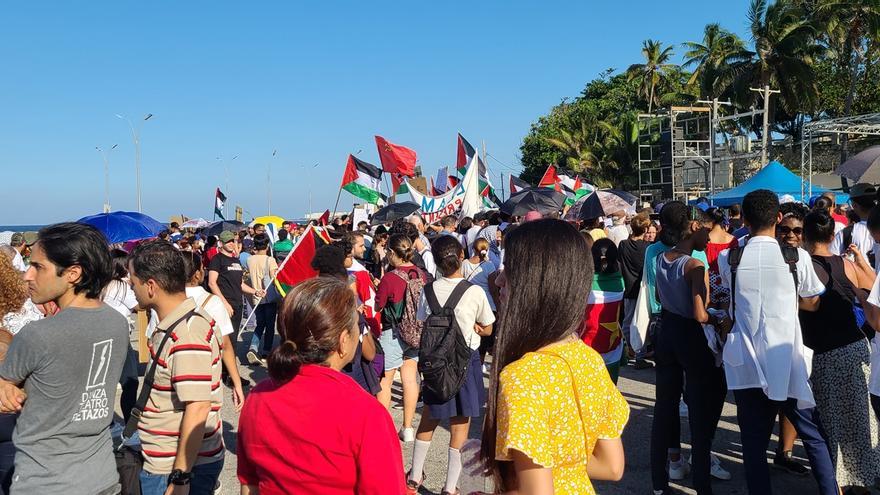
![]() 14ymedio, Nelson García and Natalia López Moya, Havana, 23 November 2023 — The march called for this Thursday in Havana by the Union of Young Communists of Cuba (UJC) “in defense of Palestine” began two hours late. Initially announced for 1:00 pm, the event began at 3:00, at G and the Malecón, to the annoyance of those marching, hundreds of young people and workers brought from their study centers and state jobs. President Miguel Díaz-Canel led the demonstration, together with the Prime Minister, Manuel Marrero, and the Palestinian ambassador to Cuba, Akram Samhan.The march toured the Malecón and culminated with an event in La Piragua, the esplanade next to the National Hotel that for years it has replaced the Anti-Imperialist Bandstand, in front of the US Embassy, as a place for pro-government rallies.
14ymedio, Nelson García and Natalia López Moya, Havana, 23 November 2023 — The march called for this Thursday in Havana by the Union of Young Communists of Cuba (UJC) “in defense of Palestine” began two hours late. Initially announced for 1:00 pm, the event began at 3:00, at G and the Malecón, to the annoyance of those marching, hundreds of young people and workers brought from their study centers and state jobs. President Miguel Díaz-Canel led the demonstration, together with the Prime Minister, Manuel Marrero, and the Palestinian ambassador to Cuba, Akram Samhan.The march toured the Malecón and culminated with an event in La Piragua, the esplanade next to the National Hotel that for years it has replaced the Anti-Imperialist Bandstand, in front of the US Embassy, as a place for pro-government rallies.
In schools of all levels in Havana, the order given was categorical: “After noon we leave for the march,” they announced in the morning assembly. Guaranteeing that volume of students added hundreds, if not thousands, of participants to the demonstration, a practice that is common in official calls but that had not been used for some time.
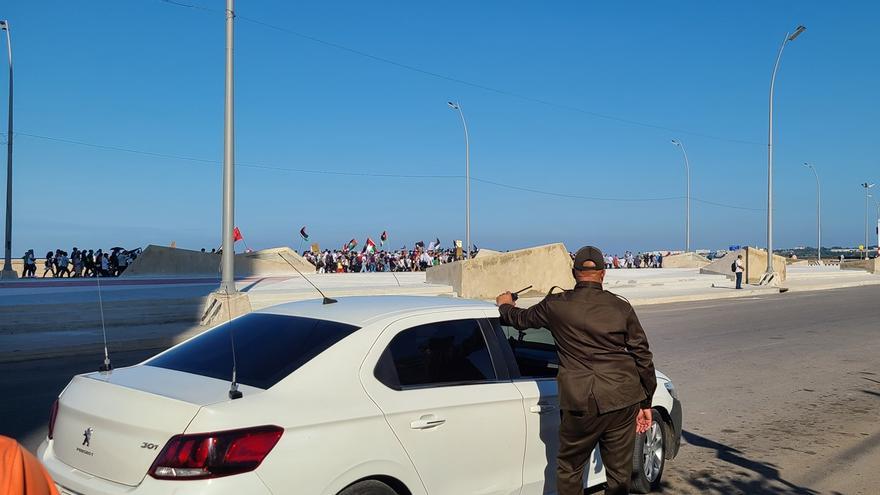
Several parents consulted by 14ymedio made it clear that their teenage children were not going to add one number to the march. “I told the director that my daughter was not going to participate because she had not been able to have breakfast,” the father of a 10th grade student at the Saúl Delgado high school in El Vedado declared categorically.
Others took advantage of the march to escape in the middle of the street despite the vigilance of the teachers who accompanied the groups of students from their schools to the vicinity of Havana’s Malecón. But others, however, had no choice.
“They had told us to show up at 12:50 and there was no one there,” protested a girl with a backpack at one point during the long wait under the Girón Building, the deteriorated behemoth that at the time was the standard of experimental architecture in the Cuban capital and which has ended up being, like so many buildings in the city, another modern ruin, with stairs about to collapse and residents upset by the lack of official response to the deterioration. Another student standing next to her answered: “I won’t have time to get the rations from the bodega.” A third teenager complained: “With the kind of hunger there is here, what is all this silliness about?”
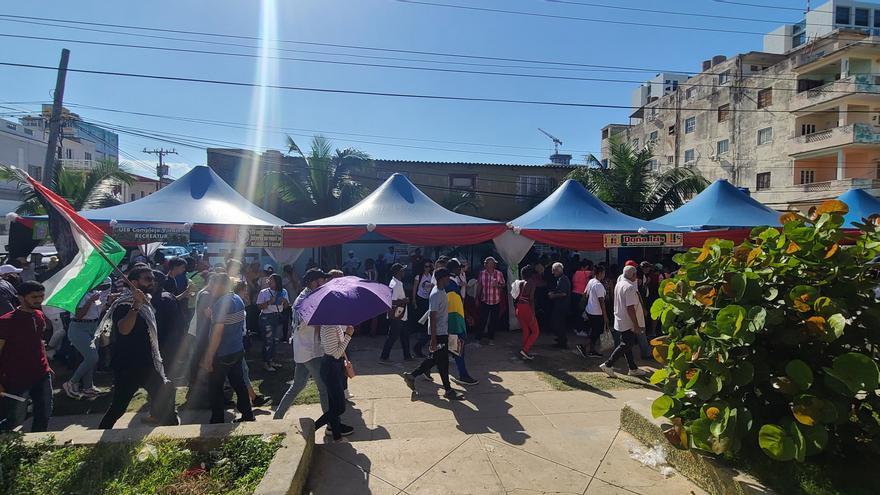
A strong police operation was deployed throughout the perimeter of the route from early on. Officers, both in uniform and plain clothes, were there every few yards.
By noon, they were already blocking passage along Havana’s iconic avenue that faces the sea. From the basement of the Girón Building, next to the meeting place of the march, an officer kicked out two women up to three times.
The only thing left was for the groups that were approaching G and Malecón to drag their feet. The vast majority were students, many from the UCI (University of Computer Sciences) and some from pre-university, but also employees from state and healthcare workplaces, guided under the watchful eye of teachers or bosses. If there were onlookers in the crowd, they seemed more like state security agents than anything else.
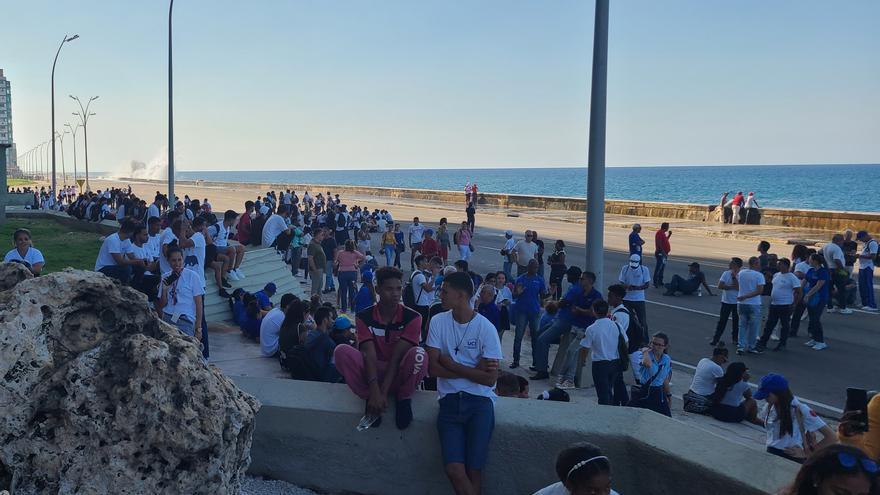
They had not arrived on foot. Between the Ministry of Foreign Affairs and the José Martí Sports Park, out of sight from the Malecón, were parked the dozens of state buses the students had been transported. “There is fuel for this,” a passerby said quietly.
The annoyaned reaction of the attendees worsened when passing by a private fair installed on F and Malecón. “Why do they put up these tents, if none of us students can buy anything,” a young man wondered bitterly. “It’s a lack of respect.”
Unlike other demonstrations around the world for the same cause, the scarcity of Palestinian flags was striking. A few loomed overhead when, finally, at three in the afternoon, a Palestinian medical student spoke to begin the march.
In broken Spanish and with a strong Arabic accent, he repeated a string of misinformed slogans: that the United States supports Israel “bombing Palestine every day,” that “it is not a war, it is a genocide,” that “they are attacking children and the elderly and hospitals,” and “have dropped the equivalent of the two nuclear bombs on Hiroshima and Nagasaki.”
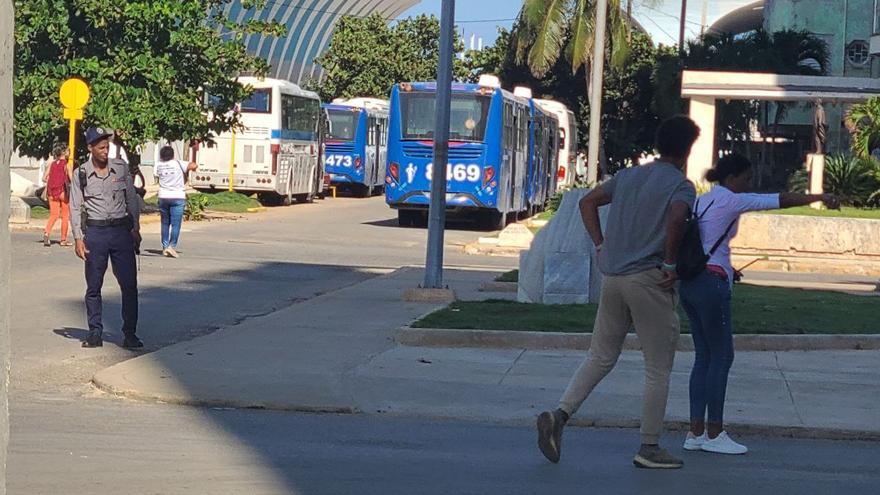
The speech was not far from the one repeated in the official media since, on October 7, militiamen of the terrorist group Hamas infiltrated Israel from Gaza, massacred 1,200 people and kidnapped more than 200, still being held by the Islamists.
Israel’s forceful military response has claimed, according to Hamas sources, but not independently verified, more than 13,000 lives.
With the mediation of Qatar, this Friday Israel agreed to a four-day truce and Hamas is expected to release 13 hostages.
Far from recounting these events in this way, the organizers of the march denounced “the more than 70 years of subjugation of the Palestinian people,” the “Dantesque usurpation” and “the impunity with which the Government of Israel launches its war machine like a wild beast.”
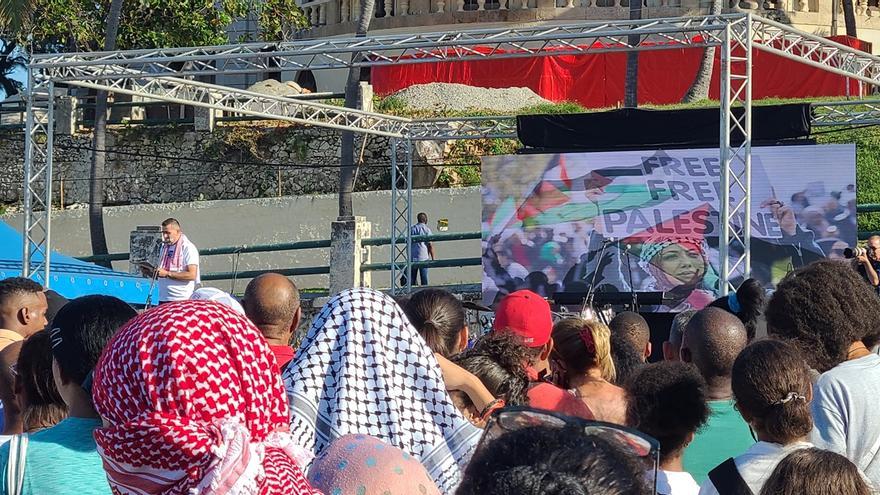
While he spoke, numerous State Security agents made strategic movements to dissuade people from leaving the place.
This newspaper asked some teenage students: “But do you know what is happening with Israel and Palestine?” Only one daring student responded: “Dude, I don’t even know where Gaza is.”
____________
COLLABORATE WITH OUR WORK: The 14ymedio team is committed to practicing serious journalism that reflects Cuba’s reality in all its depth. Thank you for joining us on this long journey. We invite you to continue supporting us by becoming a member of 14ymedio now. Together we can continue transforming journalism in Cuba.
